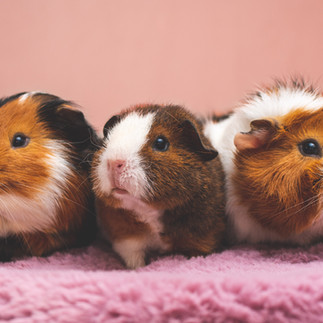The rise of Pocket Pets
- Kerrie Hyland

- Aug 8, 2023
- 2 min read
Updated: Nov 27, 2023
As humans move into smaller land sized accommodation, houses get bigger and we a become more time poor, pocket pets are becoming more popular than ever.
Rabbits and Guinea pigs can make the perfect pocket pet, they require relatively little space, and can be great for apartment dwellers with no backyard.
Rabbits make wonderful house pets, and they can be toilet trained to a litter box. They are naturally very clean animals. Rabbits can be very happy hoping around an apartment, exploring around furniture and can make a great companion for some cats.

One potential problem with having rabbits roaming around the house is their great interest, and taste for electrical cords. It is best to have supervised exploration time.
Guinea pigs are becoming more popular as their housing needs are quite basic, and they are social, with the cutest vocal repertoire.. squeaking and wheeking when anyone comes in the room, or opens the fridge. They can have their humans very well trained very quickly.
Guinea pigs do not climb or jump like a rabbit, and they do not dig. This makes them perfect for short sided cages. Like rabbits, they can also chew on electricity cords.
Both rabbits and guinea pigs need space to comfortably move around, and for rabbits, they need height to stretch up. They need a hut to escape into when feeling threatened.

The dietary needs of Guinea pigs and Rabbits are similar, though not exactly the same. They do have similar digestive systems, and are both coprophytes, which means they produce a special type of poo that they will eat.
Yes you read that right... They are poo eaters!
This behaviour developed as they have a lot of digestive function in their hind gut and their caecum. This is an area where the bacteria ferment and breakdown cellulose and other plant materials and produce b vitamins.
This process occurs after small intestine, which is their main area of absorption, so they have to eat this special poo type to have another go at absorbing these nutrients. As unappealing as it sounds for us, it's essential for their health. So never try to stop this behaviour.
Guinea Pigs cannot synthesise Vitamin C, but rabbits can.
Guinea pigs are also quite unique, as they, like humans and other primates that cannot synthesis vitamin C in the liver, so they need to have a dietary source of vitamin C. This is often sourced from fruit and vegetables, grass and other weeds and plant material. Vitamin C wafers can also be provided.
Roughage keeps the digestive system moving
Both rabbits and guinea pigs have a need for roughage in their diet. This is generally in the form of hay, or fresh grass. This roughage is important for keeping the digestive system moving and reducing the risk of gut stasis or impactions.
If you have a question about small animals as pets or would like some health support for your small pet, please comment and ask!
If your pocket pet has a specific health concern, you can book in for a small animal consultation via the link below.
Give your pocket pet a hug from me!
Kerrie
.png)












Comments